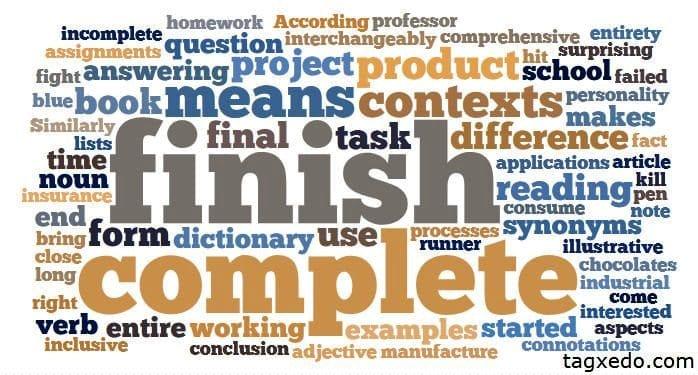At first glance, Complete and Finish seem to be just two words with the same meaning. But little do we know that they are quite different in meanings and usages. So how to know when it’s appropriate to use Finish or Complete? In this article, we are going to look into the two words and find the answer to this question.
First of all, let’s take a closer look at the meanings of Complete and Finish.
Read more:
1. Complete
Complete – /kəmˈpliːt/ can be used as a verb as well as an adjective. Let’s dive in to understand its meaning thoroughly and learn how to use it with the definition from Cambridge Dictionary.
1.1 Complete as a verb
MAKE WHOLE
(a) to make something whole or perfect
How to use: use to depict the action of making something become its best/perfect state.
Examples:
- Complete the sentence with one of the adjectives provided.
- He only needs two more cards to complete the set.
- All she needed to complete her happiness was a baby.
(b) to write all the details asked for on a form or other document
How to use: describe the action of filling all information needed in a form/written document.
Examples:
- Have you completed your application form yet?

FINISH
to finish doing something
How to use: use to depict the action of getting something done
Examples:
- He’s just completed filming his 17th feature film.
- The palace took over 20 years to complete.
- She will complete her studies in France.
1.2. Complete as an adjective
VERY GREAT
very great or to the largest degree possible
How to use: use before nouns to depict the greatness/large degree of something
Examples:
- The man’s a complete fool!
- I need a break, a complete change of scene.
- I made a complete and utter mess of it!
WHOLE
with all the parts
How to use: use before nouns to depict something with every supposed part/component
Examples:
- the complete works of Oscar Wilde
- The report comes complete with (= including) diagrams and colour photographs.
- Sun, sand, and romance – her holiday was complete.
2. Finish
Our second word, Finish – /ˈfɪnɪʃ/ has some differences from Complete in terms of parts of speech. It can be used as a verb and a noun at times.
2.1 Finish as a verb
COMPLETE/END
(a) to complete something or come to the end of an activity
How to use:
- use as a transitive verb (+ an object) to depict the action of getting something done
- use as an intransitive verb (no object followed) to depict the state of coming to an end of something
- followed by -ing verb to depict the state of coming to an end of an activity
Examples:
- I’ll call you when I’ve finished my homework.
- Please place your questionnaire in the box when you’re finished.
- She finished (the concert) with a song from her first album.
- She finished second (= in second place) in the finals.
- Have you finished reading that magazine?
(b) to eat, drink, or use something completely so that none remains
How to use: use as a transitive verb (+ an object)
Examples:
- Make sure she finishes her dinner.
- We finished (= ate all of) the pie last night.
Pro tip: For those who are likely to use smartphones, eJOY English App 2 is a great app for learning English with step-by-step courses generated from authentic videos. You can easily learn and remember not only the confusing words but also phrases and expressions that natives use every day.
2.2 Finish as a noun
COMPLETE/END
the end of a race, or the last part of something
Examples:
- a close finish
- They replayed the finish in slow motion.
3. Complete Vs. Finish – How to tell them apart?
After going through the definitions of Complete and Finish as well as looking at their usages and examples, it is now time for us to analyze the two words carefully and clearly to understand the differences between them.
One difference that is easy to notice is that the two words each can play a role that the other cannot. While Complete can play the role of an adjective, Finish, on the other hand, can present in a sentence as a noun. Otherwise, it is commonly thought that there is little or no differences in the meanings between Complete and Finish but it’s not true. Here are some distinctions between them.
3.1. Complete = Fulfill & Finish = End
Complete and Finish both share the meaning of getting something done. However, the degree in which that thing gets done is different when using each word.
‘To complete something’ means to fulfill it. Basically, you do not just wrap it up and stop doing it. But you actually give your best performance and try hard to get the best (desired) results.
In other words, to finish something means to end it. You simply don’t do it anymore.
When you say:
- “I finished my studies…” → Your studies have ended. You no longer go to school. There is a likelihood that you have graduated but it is also likely that you drop out of school or you are expelled.
- “I completed my studies…” → Clearly, you have passed all the exams and graduate from school.
For example:
- He hasn’t finished speaking. (He hasn’t ended his speech yet)
- They wanted the project to be completed on time. (They want the project to be done – with you doing your best until there is nothing else could be done anymore)
3.2. Complete – long term project & Finish – short-duration activity
Finish is used more to depict actions that last for a relatively short duration – like finishing a meal, a running race or a marathon.
- He finished eating his lunch hurriedly.
- He finished last but one in the half marathon.
Complete is more likely to be used to talk about events that last for days, months or even years like long-term projects.
- Government projects often get completed at least a year behind schedule.
- ISRO completed its mission to send a satellite to Moon.
3.3. Complete – All the tasks & Finish – One of many tasks
If you are talking about work:
→ using Finish means that you have done a certain part of the job or one of the assigned tasks.
→ using Complete which means that you have completed all the assigned tasks/responsibilities.
For example, you have to build a new house. There are many tasks to do: building the foundation, building the walls, building the roof, painting, etc.
When you are done building the walls → You finished building the walls.
When you are done building the house → You completed building the house.
3.4. If there is something more to come – It is not Complete!
Let’s take a look at this example: The whole world are waiting for the last season of Game of Thrones. The previous season finished in March. When the next season finishes, Game of Thrones will be complete(d).
When “The End” is declared, an act is completed. When there is scope for more to come, it is finished but not yet completed.
3.5. And finally, Complete and Finish in marriage context!
To light things up, let’s see how Samsundar Balgobin – a famous linguist uses Complete and Finish to define marriage in ‘A Marriage Joke’
People say there is no difference between COMPLETE & FINISH
BUT there is!
When you marry the right one, you are COMPLETE
And when you marry the wrong one, you are FINISHED…
And when the “right one” catches you with the “wrong one”, you are COMPLETELY FINISHED.
4. Practice
Fill in the blank with either Complete/Finish:
- Have you ________ reading that magazine?
- _______ the form/application.
- He _______ his drink and left.
- Your essay should be ________ before the end of the school year
- She ______ third in the marathon.
Keys:
- Finished
- Complete
- Finished
- Completed
- Finished
Hopefully, after reading this article you will no longer confuse between Complete and Finish. If you have trouble telling words apart and want to look up dictionaries, explain vocabulary, phrases on videos, meanings of words, phrases on video subtitles or any website with just 1 click, download eJOY Extension now for free!
Download eJOY extension for FREE!














